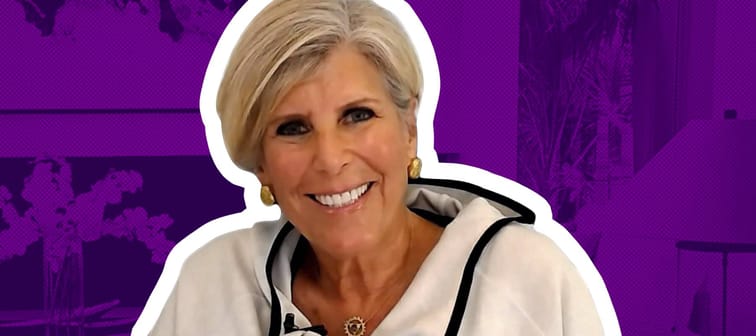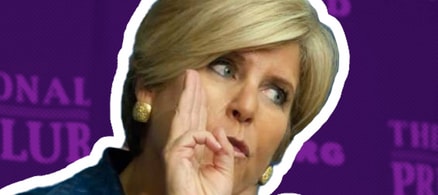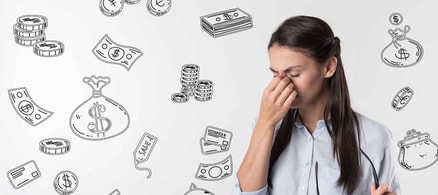WATCH NOW: Full 30-minute Q&A with Suze Orman and Devin Miller of SecureSave
That’s when a momentary crisis becomes a long-term disaster: People tap into their retirement savings and their credit cards, losing even more money in the form of fees, interest and missed earnings.
Orman has written several books on personal finance and hosts the podcast Women & Money, but now she says it’s time to go beyond advice.
“For 40 years, I've tried to change the mindset of people. People change when they're ready to — they don't do what they're told to do. They do it when they know they have to do it.”
The government steps in
Orman is right about how fragile most Americans’ finances are: In 2021, only 32% said they could handle a sudden $400 expense.
It’s only becoming harder this year thanks to inflation and higher interest rates, but Orman argues this is “not a new phenomenon.”
“It may feel like it's new because of inflation — many people alive today never experienced inflation back in the ’70s … and now they're going, ‘Oh my God, inflation is eating up our money,’” says Orman.
So while Americans may be notoriously bad savers, it’s not all their fault. As wages fail to keep up with costs, it’s become difficult for even middle-income workers to squirrel away extra money — so difficult that the federal government made moves to legislate emergency savings accounts.
Two proposals within the newly-signed Secure Act 2.0 seek to make saving easier for working Americans.
One part of the legislation — The Rise & Shine Act — will give workers the ability to opt in to an emergency savings account that would automatically skim 3% off their paycheck. Employees can save up to $2,500 in the account, with any excess savings going to their 401(k).
The other provision, under the EARN Act, allows workers to take $1,000 out of their 401(k) each year to cover an emergency, without suffering the usual early withdrawal penalties. They would be required to pay it back within three years.
While The Secure Act 2.0 was signed into law by President Joe Biden at the end of December, many of the provisions will not take effect until at least 2024.
Orman is refusing to wait that long. She’s created her own system she says will help Americans finally put money away — by taking the decision out of their hands.
Kiss Your Credit Card Debt Goodbye
Having a single loan to pay off makes it easier to manage your payments, and you can often get a better interest rate than what you might be paying on credit cards and car loans.
Fiona is an online marketplace offering personalized loan options based on your unique financial situation.
When you consolidate your debt with a personal loan, you can roll your payments into one monthly installment. Find a lower interest rate and pay down your debt faster today.
Get StartedFinding a private solution
The success of 401(k)s at getting Americans to save for retirement became the inspiration for Orman’s savings venture, SecureSave. The system, launched in 2020 during the pandemic, allows workers to automatically build up an emergency savings account with extra financial contributions from their employer.
“We came along and said, Oh, my God, if that worked for 401(k) plans, it would also work for our emergency savings accounts,” says Orman.
Orman’s co-founder Devin Miller says using the workplace as a staging ground for saving makes it a lot easier to actually take action.
“If you learn about the behavior of saving, and they're given an easier path to do it through work, we've proven with health care, with retirement, that employees will end up in a better position if that nudge happens that way,” says Miller.
“We've been able to make a big impact on health care and on retirement in this country by making it a workplace conversation and creating a safe place to do that.”
More: Explore rates of best high-yield savings accounts
Automation is the key
Employers can offer SecureSave as a benefit for their workers. It will automatically take a small percentage off the top of their wages and put it in an easily accessible savings account. The employer will also match some of the funds — typically just a few dollars per paycheck.
While workers can also add money manually, Orman says it’s the automation that makes a real impact.
“You could tell people from now until doomsday that they should do something,” she says. “That's why we need to help do it for them.”
According to Orman, it’s working.
“You know what they all say, ‘Why didn't I do this a long time ago?’” she says.
When employers kick a little in on top, it adds to the incentive to save, says Miller.
“We usually see about $100 per employee per year. But it's done in like a drip campaign. So if you put in $25, your employer is going to put in $5 — so it's not a lot of money, but it creates that incentive to start and to stick with it.”
Stop overpaying for home insurance
Home insurance is an essential expense – one that can often be pricey. You can lower your monthly recurring expenses by finding a more economical alternative for home insurance.
SmartFinancial can help you do just that. SmartFinancial’s online marketplace of vetted home insurance providers allows you to quickly shop around for rates from the country’s top insurance companies, and ensure you’re paying the lowest price possible for your home insurance.
Explore better ratesSaving brings security
Orman and Miller say they are seeing results from the companies that have implemented SecureSave — that people get excited when they see their accounts grow, and that transfers to a better quality of life.
Why should employers care in the first place? Because, they argue, a better quality of life makes for better employees.
“When you have financial stress, something's come up and you don't have the money to handle it. You think you're concentrating on work?” Orman says. “Or are you in Financial La La Land trying to figure out what am I going to do?”
A dramatic 90% of Americans stress about money, according to a study by Thriving Wallet, impacting both mental and physical health through mood, sleep and relationships.
“So when they have a place to go, they know that their employer cares about them, they start to care about themselves,” says Orman.
“They don't even miss the $25 a paycheck. And then a lot of times they come back and say I'll raise it to $30, then $40.”
With both SecureSave and the new legislation, the focus is on a low barrier to entry. Because the hard part, Orman has learned over the decades, is always convincing people to get started.
“Usually, people have to hit rock bottom before they make a change,” says Orman.
WATCH NOW: Full Q&A with Suze Orman and Devin Miller
Sponsored
Follow These Steps if you Want to Retire Early
Secure your financial future with a tailored plan to maximize investments, navigate taxes, and retire comfortably.
Zoe Financial is an online platform that can match you with a network of vetted fiduciary advisors who are evaluated based on their credentials, education, experience, and pricing. The best part? - there is no fee to find an advisor.







